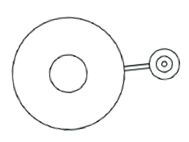Seeing Beyond
Most people are trying to do the best they can with what they have. From our perspective, with our knowledge, skill, education, experience and insight we can often find other peoples’ behaviour perplexing. Stephen Coveys’ habit of “seeking first to understand before seeking to be understood” leverages our curiosity and empathy to build better relationships.
Here is a fun visual illustration I use to show the power of perspective. What do you see?
People often guess things like ‘Flying planets’, ‘Wonky glasses’, ‘Odd doughnuts’, ‘Alien eyeballs.’
If this is you, look at it from the top down. This change in perspective often helps. People then see the small circles and feel it look like a fried egg, others see the two bigger circles and guess it is someone wearing a sombrero. The illustration is an egg being fried in a frying pan by someone wearing a sombrero. Here are a few more to tease your brain:
Many people laugh once they see the pattern and find it a lot easier to get the other ones. Some people just don’t think in that way and need help understanding each image. When you take a different perspective, you see things differently.
When we encounter challenges in our relationships, whether with friends, family, or colleagues, it's easy to jump to conclusions and assign blame. But what if, instead of pointing fingers, we took a moment to wonder about the motivations behind someone's actions? This simple shift from blaming to understanding can foster empathy and openness.
Taking ownership of our feelings is another powerful tool in our interpersonal toolkit. Rather than lashing out with accusations like "You're always running late!" we can express our frustrations more constructively: "I find myself getting frustrated when plans are delayed." By owning our emotions, we empower ourselves to communicate more effectively and create space for understanding. This can help others feel safe. It opens the doors to ask questions and help others reflect on their actions and reactions. You can ask, ‘What were you feeling that created that response? How do you think others received your reaction? How would you respond if someone spoke to you in that way?’”
What about when our perspective clashes with someone else's? It's important to remember that our perspective creates our reality. Rather than dismissing differing viewpoints, we can seek to understand them. By acknowledging and respecting diverse perspectives, we foster empathy and build stronger connections.Most relationships can be improved if you take ownership of your feelings and seek to understand another's perspective.
Is there a situation or relationship you currently have that could benefit from seeking to understand another perspective?






